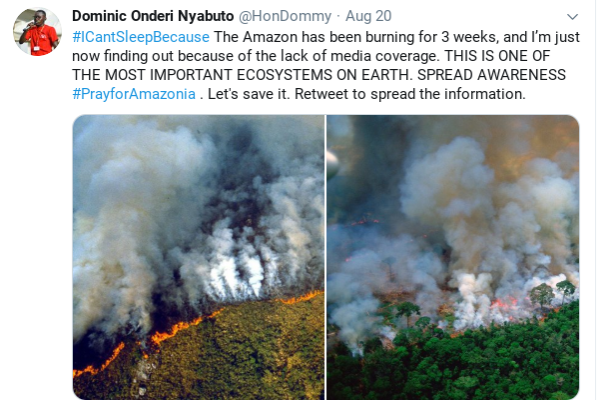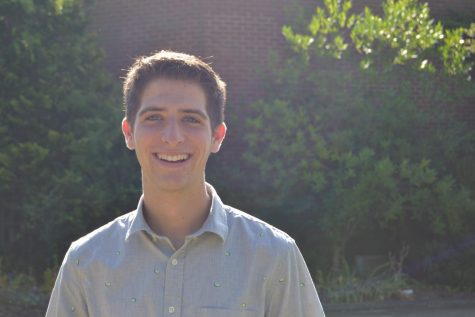OPINION: Hiding Behind the Smoke: How We Use the Media to Cover Our Own Inaction

The viral Twitter post that began the movement to raise awareness of the Amazonian fires.
As the controversy over media coverage on the Amazon Rainforest grows, it’s important to acknowledge why this lack of reporting may exist.
“The Amazon has been burning for three weeks, and I’m just now finding out because of the lack of media coverage.” Dominic Onderi Nyabuto’s Twitter post containing this line went viral on August 20 and began to expose to the general public the serious issues of an enormous wildfire spanning nearly the entire length of the nation of Brazil.
This post was retweeted thousands of times and reposted on a variety of other social media platforms, including Instagram and Snapchat stories. Each time the post circulated to new views, the idea that the fault lay in the lack of media coverage became more and more mainstream. And why wouldn’t it? Here, the media provides a perfect scapegoat and allows us as a society clear our conscious.
For years, we as a society have reinforced the idea that the environment is, at best, a topic of minor importance. When media stations publish stories about the disappearance of the North Pole? No interest. Desertification in the Sahal ruining ecosystems and livelihoods. Absolutely no traction. News about hundreds of mountains such as Kilimanjaro losing all iced peaks? Zero regard. So why would anyone expect the burning of the Amazon to be any different?
After teaching the media that we simply don’t care about or respond to environmental issues, it’s only natural that similar topics begin to get less coverage. Of course this news is important and of course the story needs to be told, but aren’t we facing the consequences of our own actions? The environment is not a lunch buffet where we can pick and choose the topics we care about.
We need to fully commit ourselves to the cause of protecting the environment. No longer can we last two weeks caring about one topic, then ignore everything else until we find a new, flashy issue that catches our eye. Even as the month of September begins and continues, social media posts about the wildfire are petering out as quickly as they arose. So, in essence, when we as a society chose to ignore a majority of environmental issues, who are we to blame the media?
Your donation supports the student journalists of McIntosh High School. Your contribution allows us to cover our annual website hosting costs, to help pay printing costs for "Back to Mac" magazine, and continuing education for staff, such as SNO trainings and MediaNow! editorial leadership training.

Zack Stone is thrilled to be joining the Trail staff for his senior year at McIntosh! His passions for reading, writing, current events, and storytelling...

